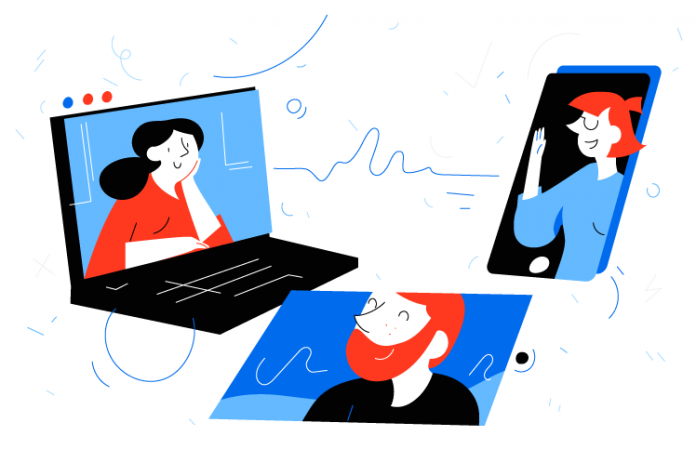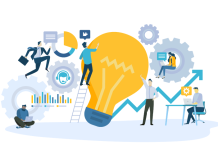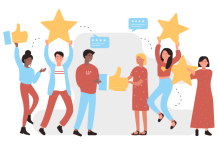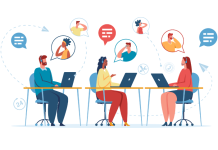
Customer service, but particularly support, has grown in importance significantly in today’s online world. Getting such help has also become a lot more convenient and easily accessible: which plays a prominent role in creating meaningful customer relationships and helps to increase customer satisfaction.
However, this trend brings a lot more pressure into the work lives of contact center agents. The number of customer queries can rise significantly, and over a growing combination of channels: which can be overwhelming.
Luckily, contact center agents can take advantage of modern solutions and use customer service/help desk software. Like with an omnichannel agent desktop to easily organize their work and stay on top of every issue.
Agent Desktop Software and Components
So, what is omnichannel agent desktop software, exactly?
It is essentially the dashboard of an omnichannel customer service/help desk solution. A user interface where contact center agents can see every piece of customer communication streamlined into a single inbox. This lets agents view their work organized by priority or other set conditions and helps them maintain efficiency in their daily work.
Let’s take a look at the most significant components you should consider when choosing an omnichannel agent desktop.
- Hybrid ticketing. A hybrid service/support ticket stream makes following customer conversations from the channels easier. For example, if a customer sends an email, then starts a live chat, and later makes a call, hybrid ticketing will store all communication in the same ticket thread. The agent then does not have to search for each new message.
- Real-time chat. Some desktop software has a live chat widget that contact center managers can easily place on websites. It allows visitors to start instant chats with agents. Chat is a lot faster than emails and calls, allowing agents to solve issues in less time. And it has a 90% total resolution rate, making it a great tool for providing an exceptional customer experience.
- Robust softphone applications. To answer or make calls does not necessarily require you to own a phone. You can make a virtual contact center just by using your laptop or phone with little or no extra equipment required. Contact center managers can connect most VoIP phone numbers with the softphone software and start making and answering customer calls.
- Social media monitoring. Following various social media accounts can be a difficult task if you have to follow conversations on each of them one-by-one. Social monitoring lets agents follow all business social media accounts from a single universal inbox. They can track every message, comment, like or mention anywhere, and streamline them in the ticket streams.
- Customer portal. They serve as a dedicated place for all types of customer support. It usually includes a self-service knowledge base, troubleshooting information, forums, FAQs, feedback and suggestions content, as well as contact information and guides. Such a portal can help reduce ticket volumes and solve many issues before customers decide to contact.
Features to Look For
Each agent desktop component needs the support of features to ensure high versatility in various scenarios.
They improve the speed of customer service and support and make many tasks easier to perform.
Take a look at some of the most useful ones available:
- Universal inbox. It may be the most helpful feature that every system should have. It streamlines all communication from every channel you use and gathers them into one shared inbox where you can see and manage everything. As a result, it can significantly improve contact center performance.
- Seamless ACD and IVR connectivity. Agent desktops must intuitively connect into these systems to get a full view of customers whether they came straight through the switches or by way of IVR trees, so that agents know the journeys they have taken.
- Customer insights. Not every department can afford a customer service/help desk solution and CRM software. That’s why good solutions often offer CRM functionality to help agents keep customer data and use it with their customer support work.
- Agent monitoring and reporting. Track every agent’s performance and find out how much time they spend working on individual tickets. Performance reports and time tracking features allow agents to continuously improve and learn to work faster while keeping their services reliable.
- Workspace gamification. Gamification features bring some fun and challenge into everyday customer service and support. They include levels of expertise, customizable badges for performance, benchmarks, and rewards. Encourage agents to give their best performance with friendly competition.
- Integrations with other business tools. These allow agents to connect other software solutions with the desktop software, bringing some extra functionality into their workspaces. With less switching between software, agents can offer many services faster. Some favorite integrations include billing software, CRM applications, and eCommerce management solutions.
Desktop Benefits
Agent desktops bring order and efficiency to any service/help desk. With that come significant benefits that can improve your conversion rates, or customer engagement. They can even decrease bounce rates, and help other areas of your business, such as sales and marketing.
However, the most important factor is the benefits that your customer base gets when you switch to a better customer support system.
Take a look at the most significant gains of equipping a service/help desk with an agent desktop.
- Automated and consistent customer service across all channels. Create and apply automation rules to improve your service and handle many tasks effortlessly. With the ability to connect all communication channels you need for your work you can provide consistent replies promptly without switching between browser tabs or different solutions.
- Unified customer view. Use service/help desk CRM features to store all-important customer data and view anytime you need to. Keep customer contact and past purchase information, values, and other essential data to identify customers. You can use this data to determine how to communicate with a particular customer, set your tone, and handle any issue correctly.
- Accurate and timely information. Thanks to the addition of customer insights, notifications, complete ticket histories, and other features, you can always make sure that your answers are accurate and fast. Use an internal knowledge base to find solutions for specific problems or to verify the information.
- Prompt and personalized service. Customers can benefit from faster response times and personalized advice. In addition, they can say goodbye to cookie-cutter replies that rarely provide insights into more elaborate issues.
- Improved agent productivity and performance. Omnichannel desktops offer various automation options that can handle many tasks faster, leaving agents plenty of time to focus on personalized service and improve their performance.
- Easy optimization for different brands and industries. Customize your agent desktop experience with custom branding options. Pick a theme, customize live chat widget design, and flash your company logo and branding in your knowledge base to get recognized.
- Scalability. Even if you don’t need every feature you have the knowledge that you can upscale (or downscale) at any time. For example, your help desk might be efficient with ticketing that supports email and knowledge base. Later on, however, you might benefit from faster communication options, such as live chat or social media integration.
Overcoming Challenges
With customer communication streamlined and organized in one place, contact center agents can overcome many communication challenges with little to no effort.
So set up rules and take advantage of organization features to help you prioritize tickets from every communications channel you use while focusing on the replies.
Agents can achieve faster response times with features dedicated to this purpose, such as canned messages, predefined answers, or email templates.
For example, the system can automatically send welcome emails to new customers during the onboarding process. In fact, research indicates that 74% of users expect to receive them within minutes of providing their email addresses.
These features also let agents reply to commonly asked questions with a few clicks and help them save time. In addition, access to an internal knowledge base within the same help desk system serves as an easily accessible information hub for every agent who needs to verify information or find solutions for elaborate issues.
Conclusion
When you know what to look for, switching to an omnichannel agent desktop experience doesn’t have to be a complex process.
The benefits will become evident right from the start. Pick the best omnichannel desktop for your contact center agents and win customer loyalty thanks to super-fast, efficient, and reliable service every day.




